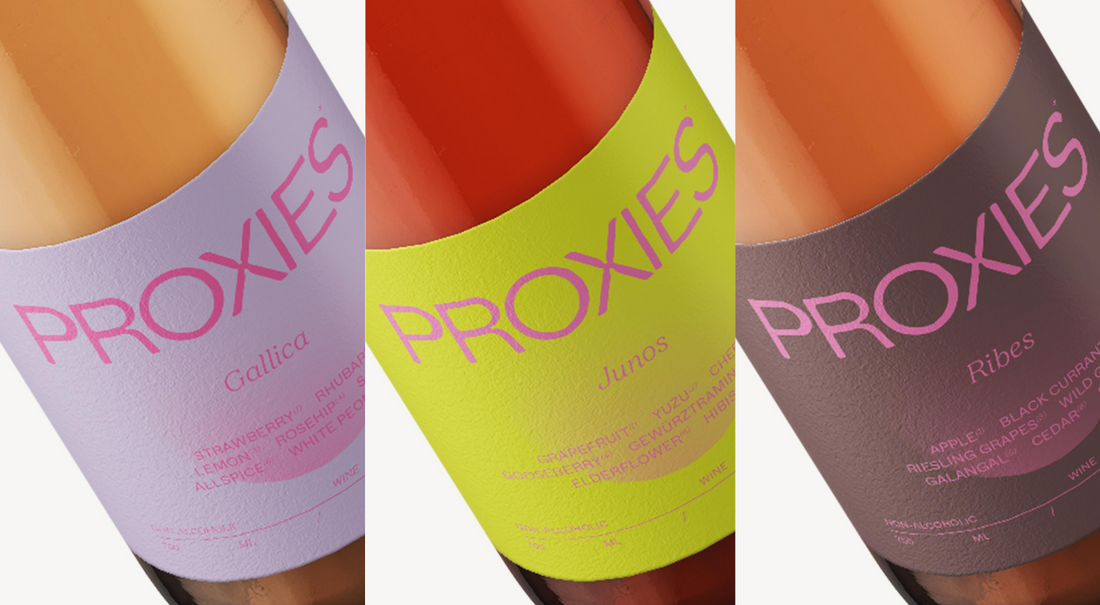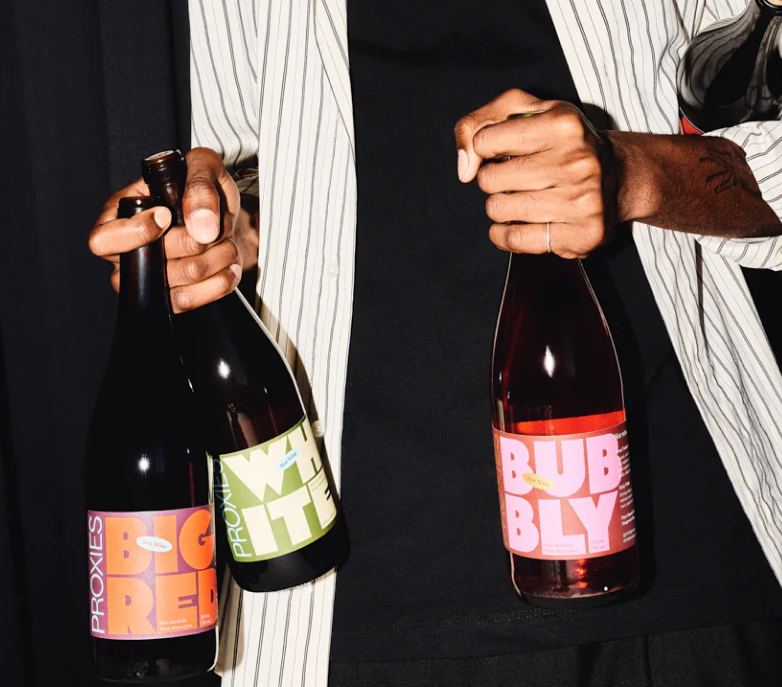
A Rosé By Any Other Name: How We Name Proxies
Share
Merlot. Riesling. Sauvignon blanc. For most of the wine world, grape varieties, geographic appellations and production methods—all codified through hundreds of years of practice and refinement—have made it abundantly clear how to define, categorize and name a wine.
But if what you’re making isn’t really wine…what do you call it?
We’re constantly blazing that new territory at Proxies, coming up with new ideas and blends as fast as we can make them. (In fact, our team creates three new bottles every month!)
A core part of that creative process: Coming up with names that are as special as the drinks themselves.
Each of our Proxies contains multiple notes, layers and nuances, with spices, bitters, teas, juices and even vinegar all playing a part—so while Zephyr might place emphasis on strawberry and rhubarb flavors, it wouldn't be quite accurate to just label it "Strawberry Rhubarb Rosé" and call it a day.
Instead, to come up with something that encapsulates each blend's flavors, drinking experience and overall vibe, our creative team does a deep dive into wine styles, geography, etymology, science, and even ancient mythology. (As you might guess, several extra-deep Wiki rabbit holes are usually involved.)
After a little lively internal debate, our Proxies are christened with a name (a sober sobriquet, you might say) that's evocative, enlightening, a little mysterious, and totally their own.
(Also, in case you were wondering: Yes, we absolutely clean up at trivia night.)
Zephyr
This term for a light, warm wind, is derived from Zephyrus, the Greek God of the western winds and a messenger of spring. For our first-ever rosé, we wanted to nod to the changing of seasons and ushering in springtime. (It's no coincidence that Rosé Day falls in late spring!)
Velvet
This red practically oozes smoothness, and it needed a name to match. Dark chocolate, coffee, cherries, black tea—this is practically a Barry White song in a glass.
Sauvage
Named for the French word for "wild", this pine and cedar-forward white is a tribute to the vast forests of our (bilingual, bien sur!) home and native land.
Nightshade
In addition to sounding extremely cool and witchy, the name of this moody, rustic red pays tribute to two of its core ingredients, tomato and paprika—both members of the nightshade family of plants, which also includes eggplants and potatoes. (We also like to think Nightshade makes an excellent accompaniment to a candlelit evening.)
Garrigue
This Proxies Club alumnus is named for the low-lying, wild hillside vegetation found in France and other parts of the Mediterranean coast. In winemaking terms, "garrigue" refers to the notes found in wines from that region: Juniper, lavender, rosemary, sage and thyme (which we drew upon to create this blend).
Alpenglow
We went for the science side of Proxies with this one: Alpenglow is a natural phenomenon in which the horizon is lit up by a reddish-pink glow, taking its name from the German for "Alps glow". That's echoed in the deep pink skins of the Gewurztraminer grapes we source from the Rhine Valley in—you guessed it—Germany. (Supplementary ingredients include pink guava and pink peppercorn—delicious, and on-theme!
Blanc Slate
Proxies OGs might remember this as one of our first-ever bottles (back when they all had two-word names). We chose this name to evoke a sense of possibility as we began creating something entirely new—but also as a riff on "blanc" (a.k.a. white) and the prevalence of slate as a mineral tasting note in many whites.
Naturally, we'd be remiss if we didn't mention our newest Proxies:
Gallica
A French rosé named after the French rose: Rosa gallica is a species of flowering plant in the rose family, native to southern and central Europe. A natural fit for a Provence-style rosé with enough crisp, refreshing character to rival a Mediterranean sea breeze.
Junos
No, we didn't name this after the Canadian Grammys. Instead, we took notes from our star ingredient: Citrus junos, better known as the yuzu, which pairs perfectly with bold grapefruit in this citrusy rosé.
Ribes
This foraged rosé gets its name from the blackcurrants (Ribes nigrum) that add deep contrast to its main flavor profile of apple, strawberry and Riesling. (Fun fact: This name originally was in the running for Junos, which also features gooseberries, or Ribes uva-crispa. The other option won out, but we couldn't miss the opportunity to make 'Ribes are immaculate' puns.)
Of course, a rosé by any other name would still taste as good chilled on a hot summer day. (That's the line, right?)
You've still got time to order our summer rosés—sign up for Proxies Club now.






















